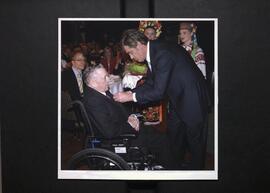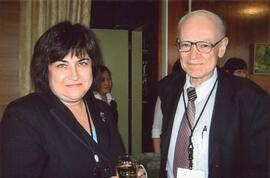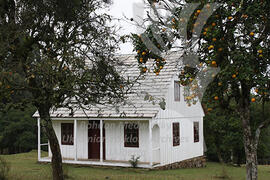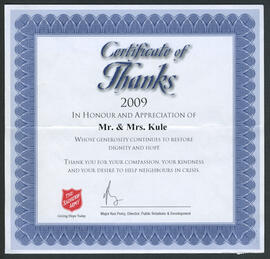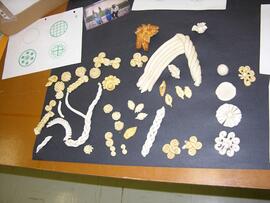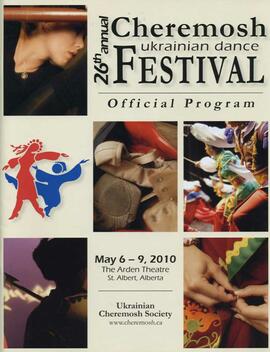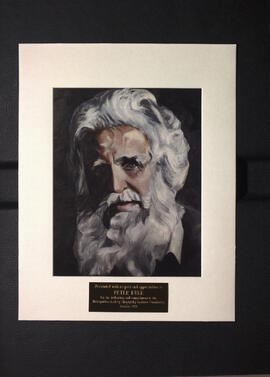Photo is of Ukraine's former president, Viktor Yushchenko, awarding Peter Kule the Order of Merit. This award is given to citizens of Ukraine as a way of recognizing outstanding personal achievement.
The series consists of documents related to Shandro Museum activities including annual financial reports, list of executive, bylaws, renaming documents, certificate of incorporation, agreement with other organizations (Alberta Museum Association), and dissolution documents.
A house of Ukrainian Brazilian Koval. He restored old grandfather's house, but the family is living in new one.
The collection consists of an interview with Dr. Bohdan Medwidsky conducted by Mariya Lesiv and Nadya Foty in 2009.
Medwidsky, BohdanThis series contains files relevant to the membership and operations of the UCBC Alberta Provincial Branch.
Please note that "Edmonton Eparchy" was more often used in organizational files that might refer to the Alberta Branch, see Series 2.7 and the subseries within for more materials.
This series contains files that are relevant to the membership and operations of the UCBC Toronto Eparchial branch
This Certificate of Thanks was provided in honour and appreciation of Mr. & Mrs. Kule for their generosity to the Salvation Army. The document is signed by Major Ken Percy, Director, Public Relations & Development.
This series contains financial records for the UCBC National spanning (1977-1986, 2000-2010).
Ukrainian Catholic Brotherhood of CanadaPaska Workshop Documentation Project was a project by Natalie Kononenko that aimed to document a workshop conducted by Nadia Cyncar, a community leader, at the Ukrainian Catholic Parish of St. George. Attendees learned about Easter traditions, as well as how to bake paska (Easter bread), how to decorate it, symbolism of decorations, etc.
The cooking was done by Joyce Sirski-Howell. The collection consists of a video recording (raw footage), audio recording and photographs of the workshop. The team who documented the event consisted of: Natalie Kononenko, Maryna Hrymych, Svitlana Kukharenko, Maryna Chernyavska and Peter Holloway.
Kononenko, NatalieThis series contains agendas and minutes from National UCBC executive meetings from 1986-1995. Other materials in this series span (1977, 2002-2010). Files contain related correspondence, minutes, promos and financial documents at times. These files also often include related correspondences and financial reports; some reports in Ukrainian
Ukrainian Catholic Brotherhood of CanadaThis series contains correspondence sent to and from the UCBC National to various organizations and individuals. There are also materials that were sent out from UCBC National to local branches and members.
Materials in this series span (1939 - 2001, 2003-2006, 2009, 2010).
Print of Metropolitan Andrey Sheptytsky with attached brass plaque. Plaque reads: "Presented with respect and appreciation to Peter Kule for his dedication and commitment to the Metropolitan Andrey Sheptytsky Institute Foundation". Plaque also includes the date December 2010
This collection contains the results of two ethnographic trips to the Ukrainian communities in Brazil by Andriy Nahachewsky. The first trip took place from 4 May to 26 May 2009, and included Andriy Nahachewsky, Serge Cipko, John C. Lehr, and Maryna Hrymych. This was the first trip to Brazil for each of the participants, though they each had strong credentials in their disciplines and in fieldwork more generally. Thus the project goal was to cast a wide net for general orientation into the historical and contemporary life of the Ukrainian communities there. Each researcher also had specific personal goals. The trip included visits to Curitiba, Prudentópolis and several rural communities nearby, Craveiro in Santa Catarina, São Paulo, Brasília, and Foz do Iguaçu. The agenda included visits to an agricultural cooperative, meetings with diplomats and organizational representatives, and diverse individuals who could speak about life in their communities. Photographs by Hrymych, Lehr, and Cipko are also accessioned into the BMUFA and located in their own respective collections.
The second trip was undertaken by Andriy Nahachewsky, for 6 months from 14 November 2009 to 13 May 2010. The goal of the project was to continue the first exploratory fieldtrip, intensifying and expanding it. The project had a strong diachronic focus, documenting change in cultural traditions, to understand better how Ukrainian cultural content, rooted in 19th century rural traditions in western Ukraine, became transplanted, disappeared, adapted, and sometimes newly created in its diaspora setting in the Brazilian context. The intent was to be able to compare these processes with similar ones known from the Ukrainian Canadian context, as well as culture in western Ukraine itself, which also changed significantly over the 20th century: One cultural root, and three branches evolving on three continents over 120 years.
Another aspect of the fieldtrip was connected with Nahachewsky’s earlier “Local Culture and Diversity on the Prairies” project, which strove to provide documentation about regional differences in traditional Ukrainian culture in the Canadian setting. This аspect of the project was to try trace local differences in Brazilian culture in a similar way. Some of these regional differences were probably most clear in past decades. A third aspect was more synchronic, aimed to document contemporary life. Connected with this, the Brazil trip involved travelling to some 65 communities in the states of Paraná, Santa Catarina, Rio de Janeiro, and São Paulo, the main Ukrainian settlement areas in Brazil. The project involved recording some 300 audio interviews, 53 hours of video recordings of contemporary events, 14,000 photographs, and gathering many publications and manuscripts (in hard copy and reproduced digitally), as well as diverse artifacts. The overall focus in subject matter was broad, including material culture (farming practices, folk arts), customs (calendar holidays, weddings, funerals, etc) and performing arts (music, dance). Special foci developed for dance materials, religious images, church architecture, cemeteries, music, and weddings, because of Nahachewsky’s research background, opportunities, and experiences as the fieldwork proceeded. The trips were both funded by the Huculak Chair and the Kule Folklore Centre (for the first trip: Nahachewsky, Hrymych, and various shared expenses). During both trips, the hosts in the home base in Prudentópolis, as well as other locations in Brazil, were very warm and hospitable, open, and generous. A copy of the digital photo, audio, and video fieldwork materials was deposited in the Museu do Milênio in Prudentópolis.
Nahachewsky, AndriyThe series contains founding documents and information about the Dr. Wasyl and Parasia Iwanec (Krysa) Endowment Fund.
Iwanec, Parasia and Wasyl